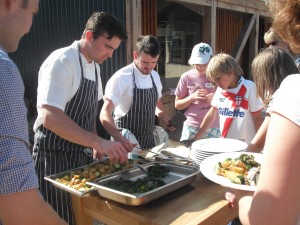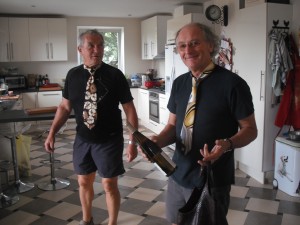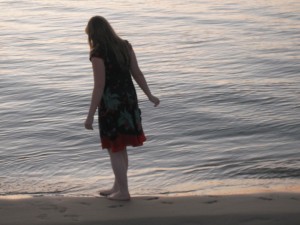

Sustainable Development
 This is not going to be yet another list of ‘what you should be doing’ because I think we are all a little fed up of that, but rather a collection of ideas of what we in our household (2 oldies, 5 youngsters) have managed to change in our daily habits without becoming sandal-wearing beardie-weirdies..we live in the real world, but are conscious that the world our kids and grandkids will inhabit won’t be the same as ours. You might not be able to do all of the things, but you might have other ideas, the important thing is to do whatever you can. So here are some suggestions Tony and I put together together, if you catch my drift, and they might just be useful.
This is not going to be yet another list of ‘what you should be doing’ because I think we are all a little fed up of that, but rather a collection of ideas of what we in our household (2 oldies, 5 youngsters) have managed to change in our daily habits without becoming sandal-wearing beardie-weirdies..we live in the real world, but are conscious that the world our kids and grandkids will inhabit won’t be the same as ours. You might not be able to do all of the things, but you might have other ideas, the important thing is to do whatever you can. So here are some suggestions Tony and I put together together, if you catch my drift, and they might just be useful.
Things really started when we moved to Brunstatt and discovered the joys of the local Saturday market in the village. It is not enormous, but it does have :
- a white meat specialist (from a farm a couple of kilometers away)
- a red meat specialist from the region who hunts most of his own meat
- two fruit and veg stands (a very local grower and one from Colmar)
- a fabulous cheese merchant who tours his favourite regions of France to pick the very best and then does the ‘affinage’ on his own premises a couple of kilometres away
- a local company which specialises in creating their own Paella
- a local organisation which sells products naturally growing in the local fields and forests (mushrooms, honey etc)
- a breadshop opposite which has its head office 5 kms away
The point is that these people are known to us: we meet them and chat and buy every week…. we know each other by name. Shopping is a pleasure. They recruit local people or their youngsters from the profits they make – and in turn they themselves spend in the local community (Economists would call that the ‘Multiplier Effect‘). I would say that on average their products may be 5-10% dearer (though sometimes they really are lower than the supermarket), but 50% better. So we spend the same amount but buy just a tiny bit less.
That got us thinking a bit when at the supermarket…
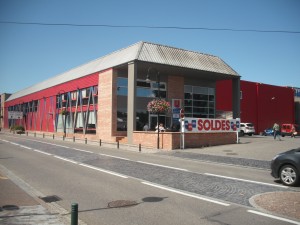
- A question : why, out of 13 different types of onions are there 12 boxes heaped up and from Chile or New Zealand…. when there are just a few scrawny individual onions from France when we grow them all year in the country and locally….(they were far cheaper at the market too!). ANS : The supermarket makes more money from it. Same for many other products too…now we do shop at our local supermarket, like everyone, for stuff we can’t buy locally, and very glad we are too to be able to do so. But just keep an eye out for the local stuff; most of them have caught on.
- What does ‘transformé en France’ actually mean? It is meant to make us think it is from France and that we are buying ‘home’ produced products… but it isn’t that… it tells you:
- clearly the origin of the product is NOT France (or they’d be saying it is of French origin (not just transformation)
- very little might be happening in France: as little as cutting something and packaging it perhaps.
- Are there green/eco/bio/’fair trade’ (commerce equitable) products in the supermarket which could be as good as the branded product but less expensive? The answer is yes. When we pay for a brand- named product, much of the price we pay is in fact for the brand name, packaging and advertising. If you look, for example, at coffee in your average French supermarket, you will find that the big brands we all recognise tend to be the more/most expensive. You can find 100% Arabica coffee from a fair trade, French company which (weight-for-weight) is FAR cheaper than the branded alternative.
It then got us thinking more about how we could / should do more for a sustainable planet. It is fine and laudable thinking about a ‘Zero-Waste’ life, but that is quite a leap for most of us… the idea is to make small changes to everyday activities and consumption which in the end will enable us to ge nearer to a low-impact, Zero-Waste target and will give us the confidence to take the next steps.
So what have we been doing?
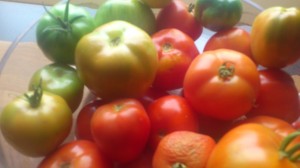
1 : Shopping for stuff
- market shopping and buying local wherever available : Mulhouse has one of the best markets in France and is known nationally for the variety of different foods it offers.
- less packaging (we take our own bags and baskets to the market)
- refusing any kind of polystyrene packaging (not at all recyclable) which goes into landfill and can never be recycled…ever…if you chuck it doesn’t bio-degrade, if you burn it, it becomes plastic gloop…horrible.
- refusing over-packaged products
- sticking to seasonal fruit and veg grown here in France or just over the border in Germany / Switzerland
- finding local products from small producers (who probably don’t get to the market): honey, jam, cheese, meat etc. This means doing your homework and spending some time sourcing but they make good presents!
- rejecting any single use plastics (like party cutlery, plastic plates, bottles, cups etc – there are recyclable alternatives in the supermarkets these days (bamboo – card-board etc) and use a water bottle or Thermos flask.
- Rejecting products that come from the other side of the world (for which there are local alternatives)
- buy less meat and more veg…. it is difficult to cut meat out entirely, but increasing the proportion of veg and fruit (and why not add fruit to main meals?) and reducing the proportion of meat helps save the planet and save the money in your pocket.
- ordering online from a farm shop : we use ‘panierfraîcheurbio’ who deliver free to you if you can find 4 other friends or neighbours to share the depot.
2 : Cooking & Composting
- making meals from leftover food rather than throwing it out (soup, quiches, risotto, veggie woks etc, etc) are useful means to re-use leftover food
- cooking ‘real’ food rather than buying unhealthy takeout or frozen meals
- collecting vegetable peelings etc for neighbourhood chickens etc (you might even get eggs in return)
- remaining veg ends into compost for the garden to enrich the soil for growing own vegetables
- exchanging your surplus garden harvest for those of friends and neighbours
- get interested in nutrition and veg & fruit rich meals…. Quite often they take a lot less time to prepare. There are great books around these days like the Simplissime and 7 Minute series…. even if you don’t have the time and fear you don’t have the experience, these publications and online recipe sites like BBC Good Food, Marmiton etc.
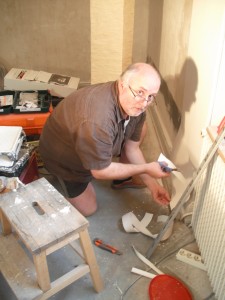
- 3 : Repairing, Repurposing and Recycling
- don’t just accept that because something has ceased to work it is ‘dead’ and ‘redundant’. It may well need little more than a clean. If that doesn’t resolve the problem, then find your nearest ‘Repair Cafe’ (We have one close by that operates twice a month or more in Brunstatt-Didenheim (see the Mairie’s website for the link) – where experts give their time freely to try to fix things. You would only pay for any parts you might need to furnish so that the repair can be done.
- Even some things that can’t be recycled can still be ‘repurposed’ or upcycled (have a look on Google using the search term ‘Life Hacks’ or ‘Best Hacks’ – you’ll be amazed!). For example, we have lots of dog-food bags and they will either be used as tomato plant pots in summer, or sewn together to make classy bags (we use ours to house recyclable stuff in the kitchen and then take it out periodically to the Yellow recycling bins). We got a nice sticker for filling the bins up to the brim from the Mairie…
- sorting recyclables ‘religiously’ – checking on what actually CAN and CAN’T be recycled, very little cannot be recycled.
- don’t just chuck things like broken electrical stuff in the ordinary bin – make a point of taking it to the recycling station / Dechet-tri.
4 : Clothing (this is not what we really want to look like!).
- favour the purchase of natural (rather than synthetic materials) – they are usually better for you, easier to repair and to recycle.
- clothes you no longer wear can be sold online (like Vinted) or given away to friends or to Caritas / Terre des hommes / Le Relais….
- resist the temptation of fashion and especially fast fashion…. better to wear things out rather than not use them or throw them out.
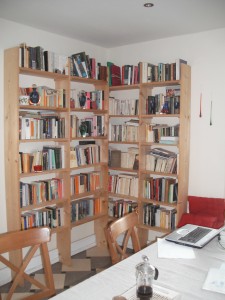
5 : Office Supplies etc.
- use recycled paper:
- buy recycled paper if possible
- use the other side of a page printed in error (most staff at university will accept this – just ask them first) and draw a line through the other side
- Set your printer preferences to draft / brouillon (it uses less than half of the ink that a standard print mode will).
- Be careful presently if you are thinking of using recycled/refilled cartridges for your printer – sometimes to stop you from doing this, the printer won’t accept them….
- Don’t buy single-use plastic pens in favour of the old fountain pen and ink from a bottle (it is cheaper than cartridges too) I have treated myself to lovely vintage Waterman and enjoy using it…after having my one-use plastic pen waved in my face by a Master’s student (I was mortified!!).
6 : Energy
- install low-energy lightbulbs / LEDs everywhere you can….
- switch off lights when leaving the room
- switch off ‘stand-bys’ if at all possible, use power breakers which you can switch off easily
- don’t overheat the interior – wear a vest or a sweater instead of turning the heating up and wearing a T shirt in winter (like our kids did)!
7 : Transport
- if public transport is not a viable possibility, then do some research on car-sharing (NB. Soléa Mulhouse website does have a car share app you can use)
- get your bikes out (get the Repair Café to give them the ‘once-over’ and recommission them) then get pedalling. The more you do – the more our councils will take note of the needs of bcyclists and pedestrians as opposed to car drivers. See the ‘un vélo, un étudiant’ project from the M2A.
- Conside your car use dispassionately: we went down from two cars (one each) to one shared vehicle. It takes more planning, but we save money on vehicle depreciation etc and have been able to have a better, younger car as a result (self-charging hybrid).
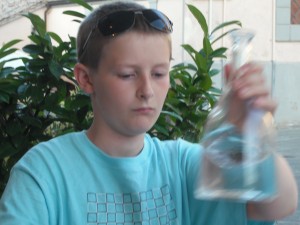
8 : Cleaning Products
- try to avoid polluting cleaning agents like ammonia, bromine, chlorine etc…. most cleaning jobs can be done with a 50/50 mix of White Vinegar (40 centimes per litre) plus water and a pich of bicarbonate of soda…. it works for most tasks (kitchen and bathroom surfaces, floors and windows etc and is less les than 1/10 of the price of special cleaners).
- Use old vests and T shirts as cloths to clean and polish stuff.
More to come – but we are now doing all of this and more……















